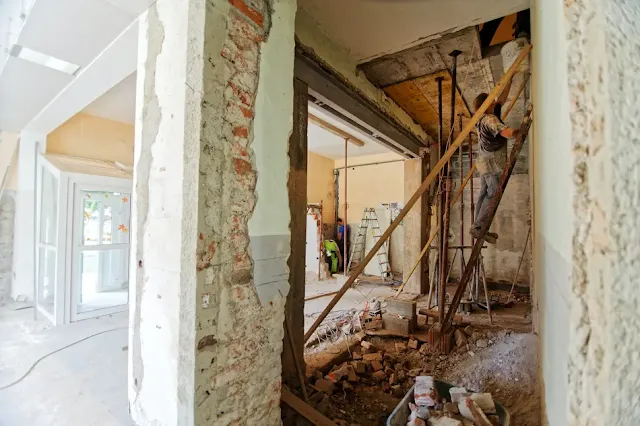Here are some helpful tips when remodeling your home.
When considering a home remodel, there are many decisions to make and
considerations to keep in mind. After all, no one wants the hassle of fixing
mistakes or costly repairs down the road due to not taking proper care in
planning a long-term investment such as renovating your home. Getting the
basics right from the start is critical to achieving successful results. In
this article, we'll take you through some top tips on what you need to know
before tackling an extensive home project - so read on to get started
constructing your ideal abode.

|
| Photo by Milivoj Kuhar on Unsplash |
Laying the Foundations for a Home Remodel: Getting the Basics Right
1. Rent a Dumpster
It goes without saying that during a home remodel, there will be plenty of
debris and waste to contend with. As such, securing
Virginia Beach residential dumpster rentals
is essential to keep your work site cleared throughout the project. From
drywall to wood and more, having a designated place for everything allows you
to focus on the task without worrying about where the trash goes.
When ordering your dumpster rental, ask questions beforehand to ensure that
you get the right size for your project. Additionally, inquire about any
additional fees or charges that may apply depending on the weight of your
debris and if any items can't be thrown away in the dumpster.
2. Consider the Right Materials for Your Remodel
When embarking on a remodel, it can be tempting to go for quantity over
quality when choosing materials. After all, you may need to hit a certain
number of upgrades or replacements to make it worthwhile. However, it's
essential to consider the long-term benefits of investing in high-quality
materials.
Not only will they last longer and save you money on future repairs or
replacements, but they can also add value to your home if you decide to sell
down the road. So, before you dive into your next remodel project, take a step
back and consider what the suitable materials can do for you - in terms of
immediate satisfaction and long-term value.
3. Make a Floor Plan
Drawing out your vision for the project allows you to visualize the space and
make necessary adjustments before construction even begins. Whether you prefer
an open-concept layout or a more traditional design, the floor plan is
critical to any building project.
Furthermore, if you are working with an architect or contractor, ensuring that
everyone is on the same page regarding your vision for the space is essential.
Drawing out a floor plan allows them to understand precisely how much work
needs to be done and what materials need to be used.
4. Have a Contingency Fund
No matter how well-planned your remodel is, certain unforeseen circumstances
can arise when a project of this magnitude occurs. For example, you may come
across damaged walls or carpentry that needs to be replaced. As such, it's
essential to
have a contingency fund
built in for any unexpected costs that may arise during the project.
With a backup plan, you can rest assured, knowing that you will need the
necessary funds to cover any additional repairs. This way, you can focus on
making your home remodel project perfect without worrying about unexpected
costs.
5. Assess the State of Any Existing Infrastructure
Before beginning work on your home remodel, it's essential to consider the
current state of any existing infrastructure. This includes everything from
electrical and plumbing systems that may need an upgrade to structural
elements such as walls or roofing that could need repair or replacement.
Taking the time to assess the state of any existing infrastructure will save
you time and money in the long run. Not only can it help keep your remodel
project moving without any major issues, but it also prevents hazardous
situations from arising down the line due to improper maintenance of these
systems.
6. Consider a Home Warranty
It's wise to purchase a home warranty to protect you from any unexpected
repairs or replacements needed after the remodel. This coverage can provide
peace of mind and help reduce costs if an appliance or system fails after your
renovation project. In addition, it can also offer protection against
structural damage or unforeseen issues that may arise due to natural wear and
tear or other circumstances.
When looking into home warranties, be sure to ask any questions you may have
about what is covered - as well as the fee structure for each policy. This
will give you an idea of how much coverage is right for your budget and which
features are worth investing in.
By following these simple tips, you can lay the groundwork for a successful
home remodel and confidently create your dream space. With careful planning
and preparation, your project is sure to be completed on time and within
budget - allowing you to relax and enjoy your new abode for years to come.
More similar stories:
- 4 Practical Tips On How to Plan For Your Home Renovation
- 5 Easy Tips To Fireproof Your Home
- How To Know If Buying Or Renting A Home Is The Best Option For You
- 10 Creative DIY Projects for Rented Home Makeovers
- 5 Simple Ways To Keep Your Home Pest-Free For Your Family’s Safety
- How To Choose The Best Air Conditioner For Your Home [Easy Guide]
This post may contain affiliate links, including those from Amazon Associates, which means that if you book or purchase anything through one of those links, we may earn a small commission but at no extra cost to you. All opinions are ours and we only promote products that we use.
Download a free copy of my Churches of Nueva Ecija eBook HERE!
Post a Comment